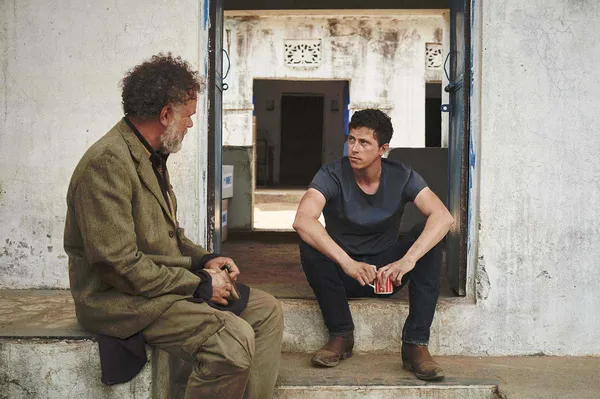 |
| John C Reilly and Finnegan Oldfield in Thomas Bidegain's soul searching Les Cowboys |
On the afternoon when Thomas Bidegain is presenting Les Cowboys at the Alliance Française, where the week before I introduced Axelle Ropert's Tirez La Langue, Mademoiselle, he gave me some insight on working with Jean-Pierre Dardenne and Luc Dardenne, Jacques Audiard and Noé Debré. Connecting Paul Schrader's Hardcore with Martin Scorsese's Taxi Driver and John Ford's The Searchers by way of Slavoj Žižek in Sophie Fiennes' The Pervert’s Guide To Ideology and the Iliana Zabeth Bertrand Bonello Saint Laurent and House of Tolerance link to Finnegan Oldfield and Nocturama weave through our conversation.
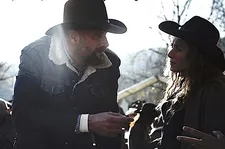 |
| Alain (François Damiens) and Nicole (Agathe Dronne) |
François Damiens (Katell Quillévéré's Suzanne) plays Alain, husband to Nicole (Agathe Dronne) whose daughter Kelly's (Iliana Zabeth) disappearance during a French country-western festival triggers a relentless search that jeopardises the family's unity. Their 13-year-old son Kid (Maxim Driesen), is taken along by the father, at first to witness. He becomes a young man (Finnegan Oldfield) who himself has been indoctrinated, which leads him into unknown territory, where he meets The American (John C Reilly).
Anne-Katrin Titze: Let’s talk a bit about Alain and how oblivious he is to the world around him. All he cares about is finding his daughter.
Thomas Bidegain: Absolutely. He doesn’t care to be in Yemen, or in the northern part of France, or Belgium. It’s the same. Kid is different. Kid learns from his surroundings.
AKT: He takes off where the father starts but then goes his own way.
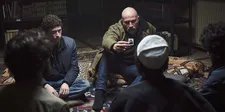 |
| Kid (Finnegan Oldfield) with his father Alain looking for Kelly |
TB: Exactly. But the father doesn’t care. There is that scene where the guy invites him to have coffee and says “It’s good that you see how we live.” And he says “I don’t give a damn.” This is really a scene that we wrote, saying - like Alain is saying to that Arabic guy - don’t be mistaken, this is not a social film!
AKT: The way Alain talks to the little girls he confronts - he is totally oblivious that he is talking to little girls there under these circumstances. Did you see Slavoj Žižek talking about The Searchers in The Pervert’s Guide To Ideology?
TB: No but that sounds great.
AKT: Žižek talks about Taxi Driver being a remake of The Searchers.
TB: Absolutely. And Hardcore. Both had the same writer [Paul Schrader]. It is really what we were trying to do. It was the beginning of the film. The father sees that as The Searchers and then the son will take it further down or further away. That’s how we built the screenplay.
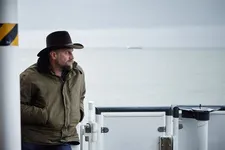 |
| Alain: "He doesn’t care to be in Yemen, or in the northern part of France, or Belgium. It’s the same." |
The father believes he is a cowboy. So he will think that the Muslims currently are the Indians. So when he is in the northern part of Europe, following some guy like the White Rabbit in some Muslim school, for him it’s like being in Apache territory. Yours is a very smart reading of the film, very interesting. You’ve seen everything.
AKT: The Tennessee Waltz turns into a lullaby at the worst possible moment.
TB: It’s such a beautiful song and it tells the story of the film. I listened to a lot of country music. I normally never do that. The sound of that song, sung by Connie Francis, is like a souvenir of a song. Because of the reverberation, it’s really not like a song but like a souvenir or something.
AKT: That scene comes right after the first “No” of the son.
TB: Exactly. And guilt is going to be part of the motivation of the son, I believe.
AKT: There is a scene at the dinner table when the father returns with the bandana right before a big time leap. And the mother and son don’t ask any questions. The family dynamics and the underlying guilt are there without a word.
_225.webp) |
| "Kid is different. Kid learns from his surroundings." |
TB: Actually, I had dialogue in that scene. I think that’s the moment when the father loses it. I believe when you reduce the amount of information you give to the audience, you give them more space to project their own feelings onto what is happening on the screen. Having this scene silent, you really see the dynamics of the family very clearly. And how they start being scared of the father.
AKT: Were you placing hints at incest in the beginning? Or is that up to the audience?
TB: No. The way I wrote and shot it also, I put more emphasis on the dance. But it’s true, each time there will be people in the audience saying, wow, there’s something weird, fishy between the father and the daughter, which is not true. He is just very proud to dance with his daughter in front of everybody. But there was no element in my mind. So I trimmed it down to make it more simple.
AKT: You use the terrorist attacks as structuring device. 9/11, London, Madrid.
TB: That was our ambition from the start.
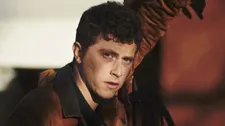 |
| "It took me two weeks to “speak the Oldfield.” |
AKT: It gives the plot time stamps. We hear of London and know it’s July 7, 2005.
TB: Even if you don’t remember exactly the time. 9/11 is really the turning point of the film. Before that people didn’t even realise there was a war going on. When the first plane hit the first tower on that day, people thought it was an accident.
AKT: I remember very well. I was here.
TB: And when the second plane hit the second tower, people said - this is war! We’ve been naïve up to that second plane. [In Les Cowboys] the father doesn’t really understand what is going on, what is the jihad or anything. But when Kid sees 9/11 it is like receiving a postcard. It’s like a postcard from his older sister.
AKT: One postcard with the baby photo and the other 9/11. The Dardennes were co-producing?
TB: Yes, they were co-producing. I met them because they co-produced a film that I wrote, called Rust And Bone. I met with them with Jacques [Audiard]. We spent some time talking, the four of us, which was nice. I felt like, Audiard brothers and Dardenne brothers. We spent a long time discussing how they work as a couple and how we work as a couple - who was doing what. Part of my film was shot in Belgium, and when it came time, they said, sure. They were very good. They gave me notes on the screenplay. I respect them so much.
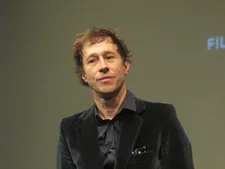 |
| Bertrand Bonello: "Finnegan Oldfield is in Bertrand’s next film." Photo: Anne-Katrin Titze |
AKT: Any Dardenne note for a particular scene you want to share?
TB: They were absolutely right. “You don’t need this. You don’t need that and you don’t need this.” They didn’t say it that way. They said; “This scene is brilliant, but it may work better this way ... This we love, but if you take this out …” They were very considerate. And even if I didn’t do it in the screenplay - in the editing room I did!
AKT: Is there more directing in your future?
TB: Yeah, I hope. I wish to keep on writing for others and direct and write my own stuff. You learn so much when you write for others. And I believe cinema is a collective sport. It’s very nice to work with great directors and at the same time, I’ve got the bug! Working with actors is really the great thing. It’s why I wanted to direct.
You can write a scene 40 times, at the end of the day, you’re going to whisper something into the ear of an actor and everything will turn different. Finding the right way! Finnegan Oldfield, it took me two weeks to “speak the Oldfield.” Or you have to speak “the John C Reilly.” Each one has their own little ways and you have to understand and listen a lot. I really enjoyed it.
AKT: The actress who plays Kelly was in Bertrand Bonello’s Saint Laurent and House Of Tolerance. Did he suggest her to you?
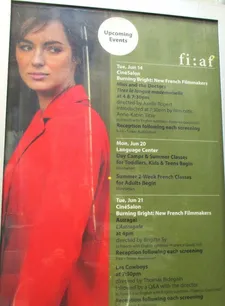 |
| Burning Bright: New French Filmmakers at the Alliance Française poster |
TB: Absolutely. And Finnegan Oldfield is in Bertrand’s next film [Nocturama].
AKT: What is that one about?
TB: Oh, it’s about terrorist attacks in Paris. He did it before. He was editing. Five attacks in Paris at the same time and it’s exactly what happened the day of the Bataclan. He was editing the film then, it was weird. It’s weird, there’s two films that I wrote that came out. Dheepan with Jacques and Noé [Debré] and Les Cowboys that I wrote with Noé. Both of those films took four years to get made, two years to write. And then Dheepan came out during the summer, exactly during the crisis of the immigrants. It really was right on. Les Cowboys came out one week after the Bataclan attack. I think it’s great that cinema, French cinema takes reality.
AKT: What is the subject of your next project?
TB: I have an idea of a couple being stuck on a deserted island. A very cold island in the extreme south of America. It’s a couple, they are traveling, and then they lose the boat. They are stuck. The rituals, the things you have to do not to kill each other - it’s like that.
AKT: Robinson Crusoe …
TB: And his wife, Madame Crusoe!
AKT: Thank you.
TB: That was really lovely.
Read what Thomas Bidegain had to say on working with John C Reilly, David Lynch's Mulholland Drive cowboy, a Bronski Beat Smalltown Boy rendition, James Coburn in Sergio Leone's Duck, You Sucker, John Huston's The Man Who Would Be King and an upcoming screenwriting project, The Sisters Brothers, directed by Jacques Audiard.
Les Cowboys opened in the US on June 24 and will open in the UK on June 26.





















